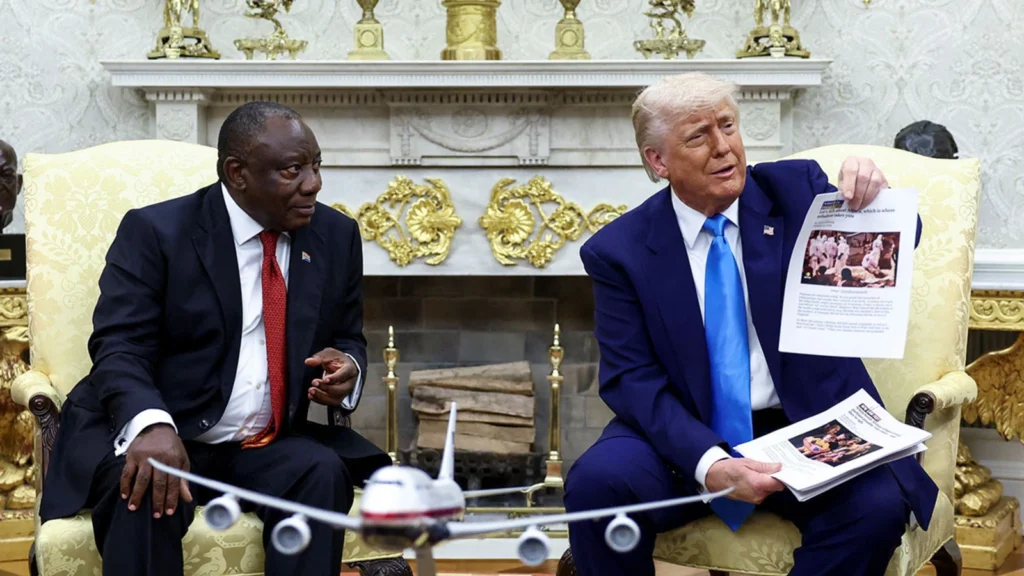Tensions Rise as Trump Confronsts Ramaphosa in Controversial Meeting
In a dramatic encounter that showcased deep political divides, former U.S. President Donald Trump confronted South African President Cyril Ramaphosa during a recent White House meeting. The confrontation, characterized by Trump’s allegations regarding the persecution of Afrikaners, drew responses from political figures and citizens in South Africa, exposing a nation split on the interpretation of recent events.
The Unfolding of the Meeting
The meeting took an unexpected turn when Trump presented videos of South African opposition leader Julius Malema, known for his controversial song “Shoot the Boer,” which falls in line with allegations of violence against white farmers. The Solidarity Movement, representing far-right Afrikaner interests, quickly lauded Trump’s intervention, declaring that it brought South Africa’s “enormous problems” into global focus.
Ernst Roets, a prominent figure in Afrikaner politics, praised Trump on social media, stating, “Donald Trump made history today,” and even suggested that Trump deserved a Nobel Prize for his actions. However, Pieter du Toit, a respected Afrikaner columnist, noted that the American right’s viewpoint was being erroneously fueled by misrepresentations from South African activists.
Ramaphosa’s Composed Response
Throughout the heated discussions, President Ramaphosa maintained his composure. He acknowledged the complexities of crime in South Africa, highlighting that the country operates under a government of national unity aimed at addressing issues affecting all racial groups. With an unemployment rate of 32% predominantly impacting black South Africans, he emphasized the pressing socio-economic challenges that overshadow racial narratives.
“South Africa is a democracy,” Ramaphosa assured Trump, affirming that while the South African government opposes Malema’s sentiments, the Economic Freedom Fighters (EFF) are constitutionally entitled to their existence.
Diverse Perspectives on the Encounter
The meeting sparked outrage among many South Africans, who accused right-wing groups of undermining national dignity by appealing to foreign powers for intervention. Critics argue that local governance efforts, such as social initiatives and policing reforms, are crucial in addressing crime, which affects all demographics.
| Perspective | Description |
|---|---|
| Right-wing Afrikaner Groups | Celebrated Trump’s intervention, claiming it highlighted issues of white persecution in South Africa. |
| Cyril Ramaphosa | Focused on democracy and unity, emphasizing comprehensive crime issues affecting all South Africans. |
| Critics | Asserted that appealing to Trump undermines local governance and the nation’s efforts to resolve crises internally. |
Broader Implications
The ramifications of the Trump-Ramaphosa exchange extend beyond mere political discourse. It exemplifies an alarming trend of external influence on South African affairs, where perceptions of race and entitlement intertwine with complicated historical legacies. Despite their differences, numerous stakeholders in South Africa recognize that crime remains the core issue, transcending racial boundaries.
As discussions about land reform and economic equality heat up, both local leaders and ordinary citizens are calling for solutions rooted in cooperation rather than division. With the international spotlight now shining on South Africa, it remains to be seen how this confrontation will shape future dialogues about race, governance, and unity within the “Rainbow Nation.”


